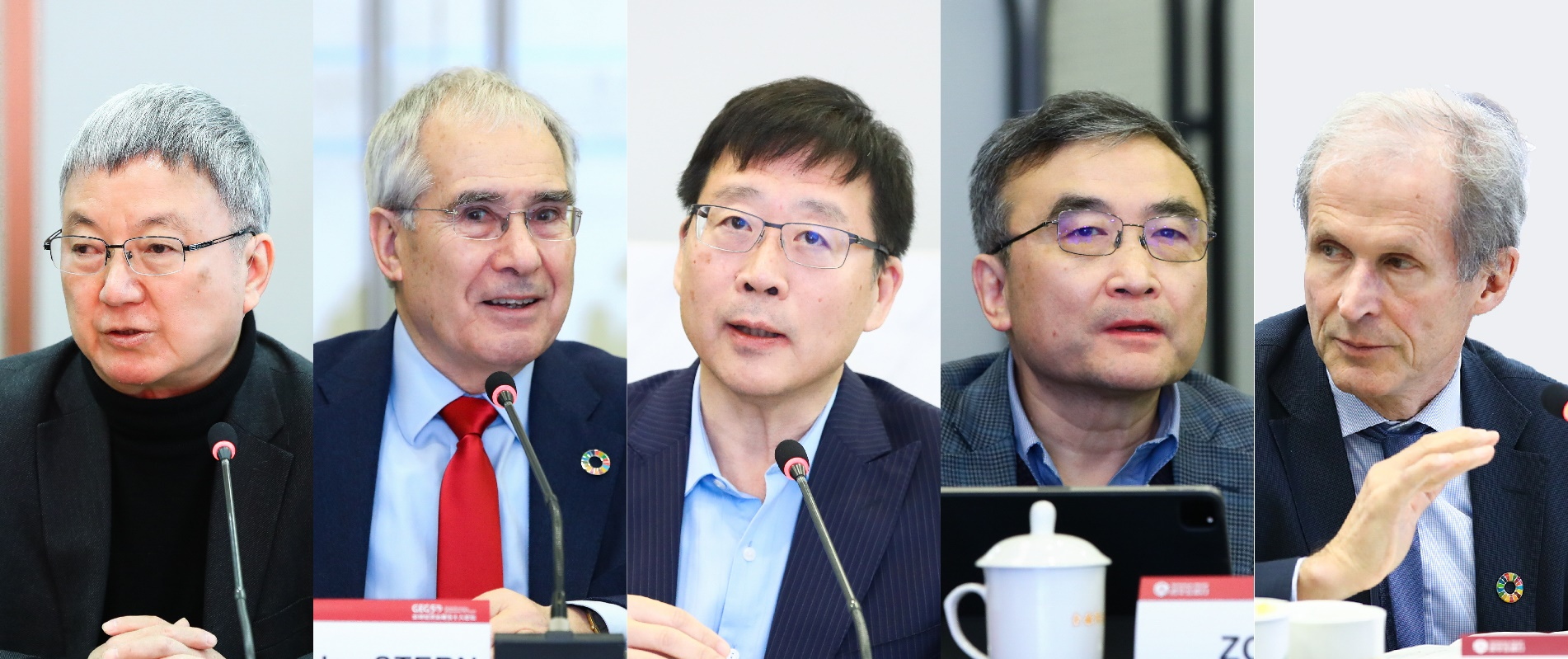On March 23, the 50-person Forum on Global Economic Governance held a closed seminar on "The Latest Development and Governance of Carbon Neutrality," focusing on the sustainable development and energy transformation of the world and China. The meeting invited Nicholas Stern, Chair Professor of the London School of Economics and Political Science, Wang Yi, Deputy Director of the National Expert Committee on Climate Change, Zou Ji, CEO of the Energy Foundation and President of China, Eduardo Eva, Chief Economist of the Asian Infrastructure Investment Bank, and Erik Berglof, who attended and gave a speech. The seminar was hosted by Zhu Min, founder of the 50-person Forum on Global Economic Governance and former Vice President of the IMF. More than 40 guests attended the meeting, including expert members of the 50-person Forum on Global Economic Governance, as well as teachers and alumni representatives of Tsinghua University PBC School of Finance.
From left to right: Zhu Min, Nicholas Stern, Wang Yi, Zou Ji, Erik Berglof
Nicholas Stern delivered a speech titled "The Growth Story of the 21st Century: Building Sustainable, Resilient, and Equitable Development." He discussed the relationship between addressing climate change and achieving growth, focusing on policy formulation, investment, and the role of China in global transformation. Stern emphasized that China's example has a significant impact on global transformation and that China needs to formulate consistent policies and strategic goals, along with a series of clear measures to support them.
Wang Yi delivered a speech on "UAE Consensus, Multiple Uncertainties and China's Climate Policy Progress." He reviewed the overall development of green and low-carbon transformation from the latest global progress on climate change and China's policy changes. He pointed out that China should adopt a systematic approach to promote green and low-carbon transformation, more actively and steadily advance carbon peaking and carbon neutrality, and independently choose its transformation path. Additionally, China needs to strengthen legislation, such as promoting the Energy Law and Atomic Energy Law, and continuously improve the management system.
Zou Ji shared his insights on "Carbon Neutrality with Economic Support." He summarized the Energy Foundation’s efforts in helping achieve carbon neutrality and carbon peaking in China, particularly among provinces and cities. He noted that while China's carbon-neutral economy has developed to a certain extent, there are still gaps between various regions. A governance framework needs to be established to conduct macro and micro dynamic analysis at both central and local levels, considering environmental needs and industry policies, and to seek solutions for optimizing overcapacity.
Erik Berglof discussed "Carbon Neutrality Promotion and Governance: Insights from China, India, and Brazil." He pointed out that based on important conclusions from China’s experience, a carbon price alone is insufficient. Full coordination among different government departments, oriented towards emission control, is necessary. While China is capable of this coordination, India, Brazil, and most other countries require massive investment and support in technology and capital to achieve similar coordination. How to effectively and efficiently achieve such transformation in these countries is a crucial topic.
Subsequently, the guests actively discussed topics such as trade protectionism, U.S. policies on climate change and clean energy, green technology innovation and risks, and nationally determined emission reductions (NDC).
This conference was hosted by the 50-person Forum on Global Economic Governance and organized by Tsinghua University PBC School of Finance.